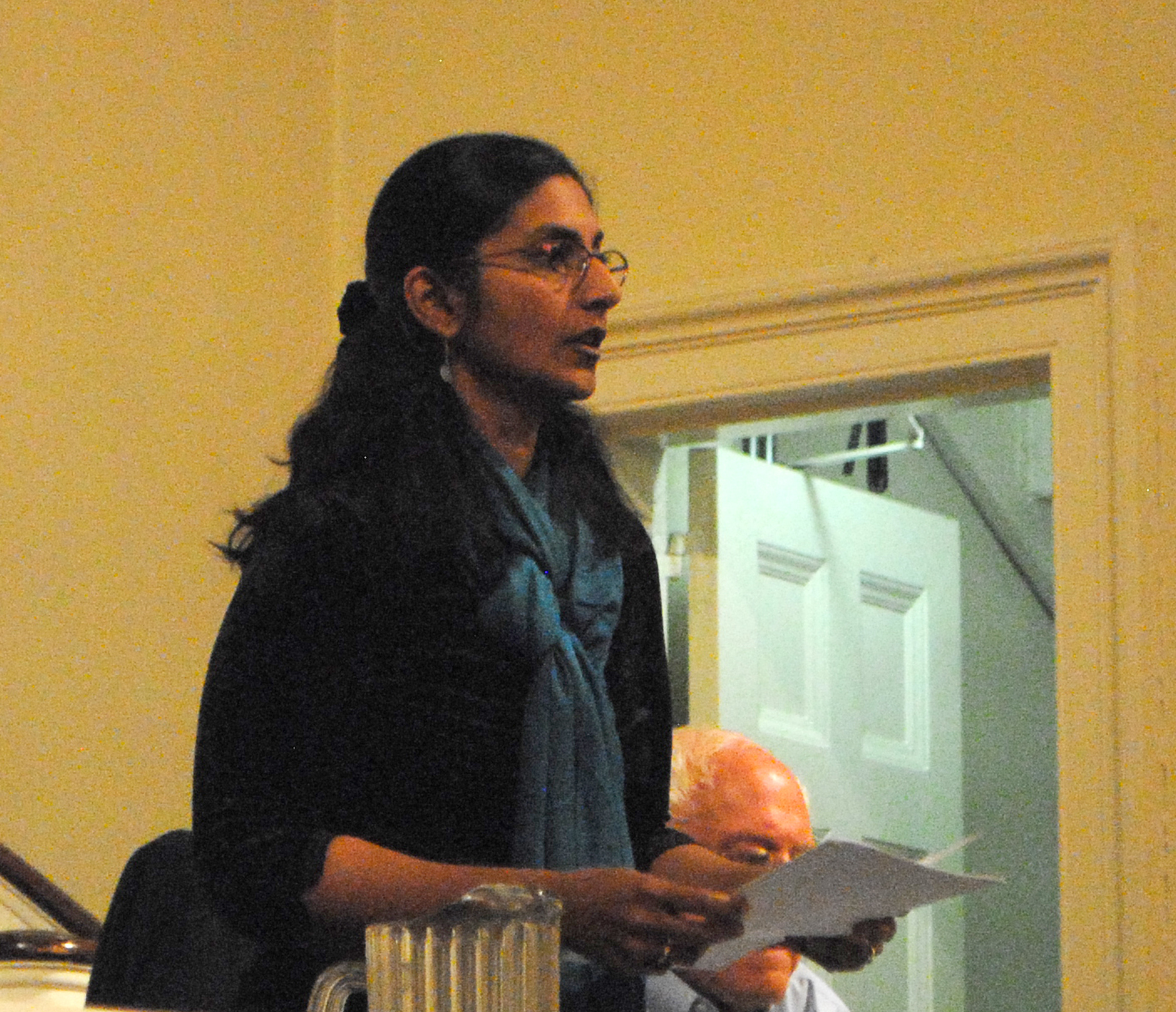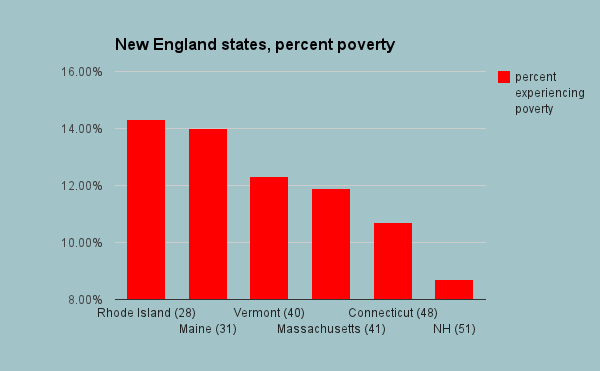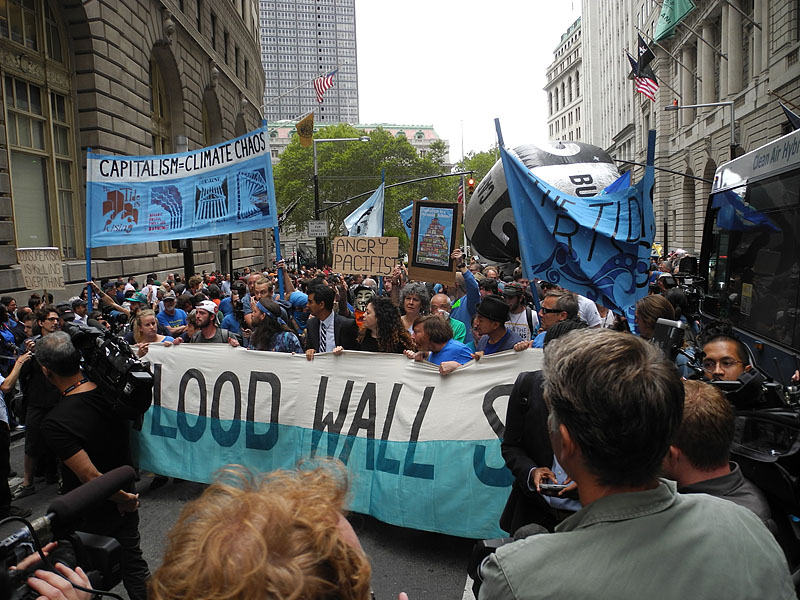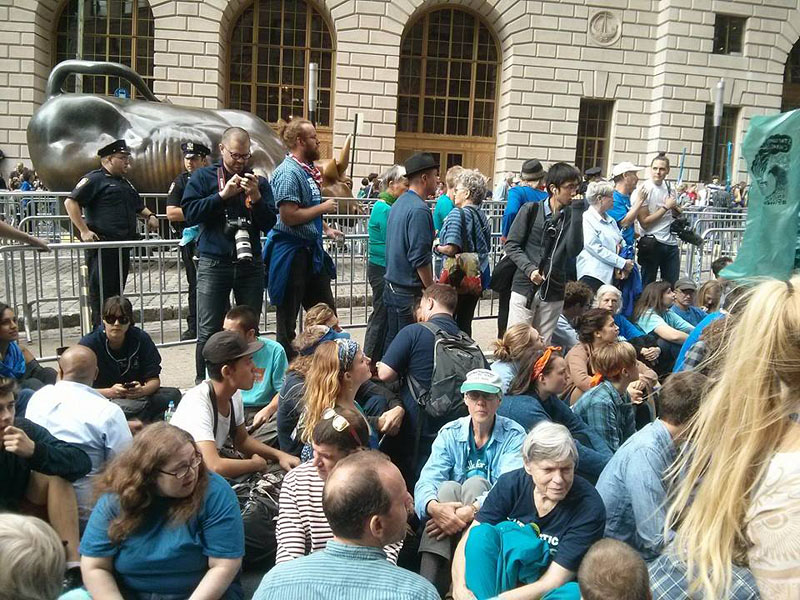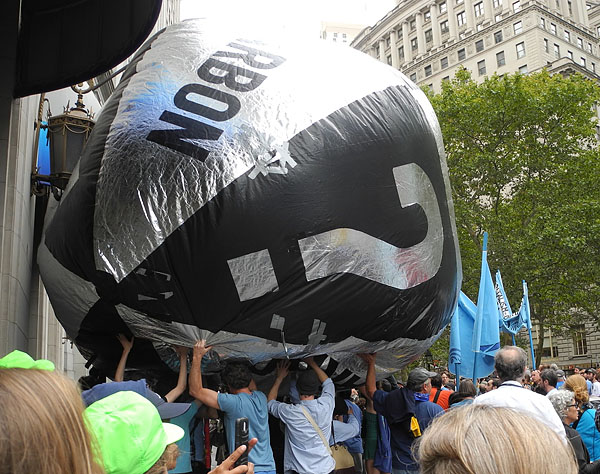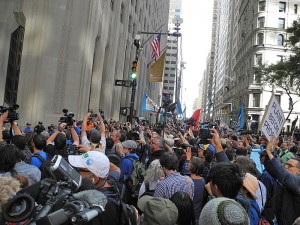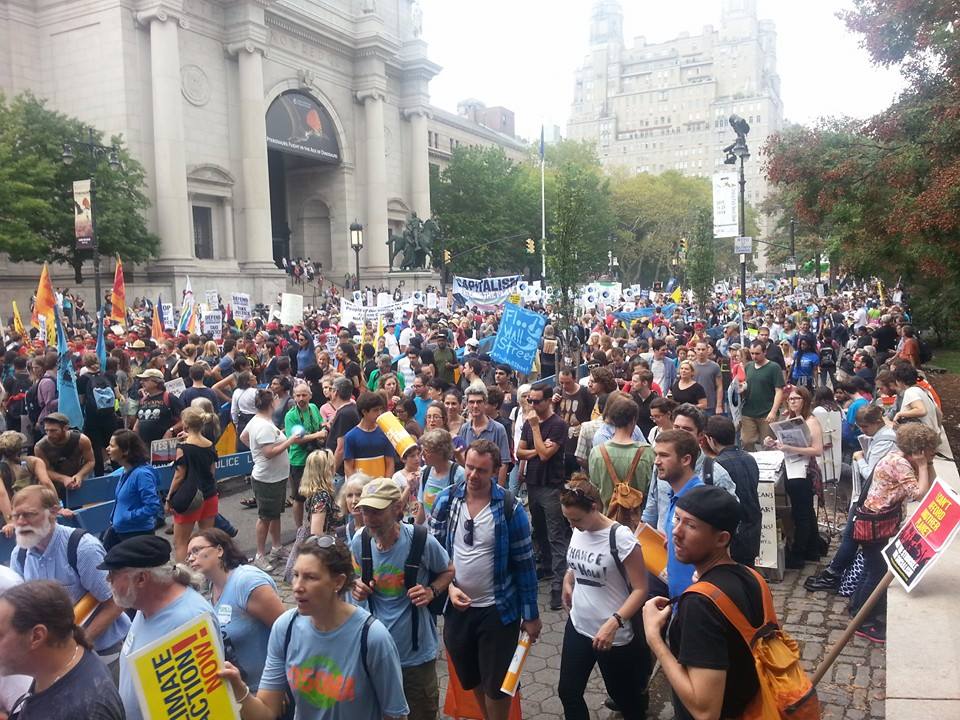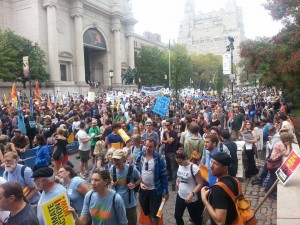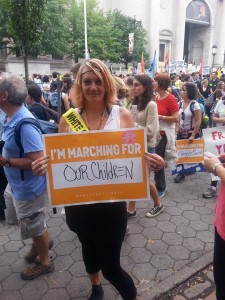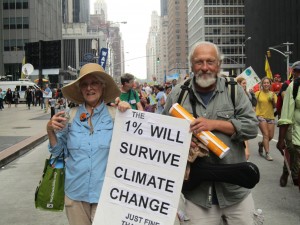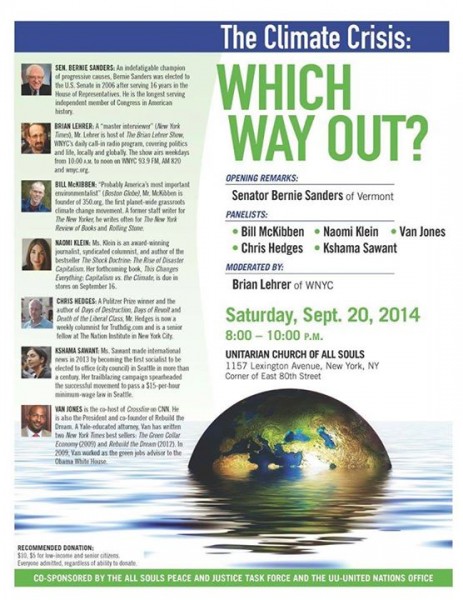 Arriving in New York for the People’s Climate March a day early allowed me the opportunity to attend The Climate Crisis: Which Way Out, a forum featuring Senator Bernie Sanders, climate activist Bill McKibben, author Naomi Klein, journalist Chris Hedges and Seattle City Councillor Kshama Sawant.
Arriving in New York for the People’s Climate March a day early allowed me the opportunity to attend The Climate Crisis: Which Way Out, a forum featuring Senator Bernie Sanders, climate activist Bill McKibben, author Naomi Klein, journalist Chris Hedges and Seattle City Councillor Kshama Sawant.
The event was hosted at the Unitarian Church of All Souls, not too far from Central Park. Seating was first come, first serve, and it filled up quickly. While waiting outside, I noticed Chris Hedges making his way to the event, occasionally stopping to exchange words with those in line. His public persona so dour, it was refreshing to see Hedges smile and enjoy his interactions with the public.
Those waiting in line were targeted by a steady stream of leafleteers offering the opportunity to attend other climate change related events. Young people wearing Socialist Alternative t-shirts, the group made famous by Kshama Sawant, worked the line, selling copies of their newspaper. I’ve often thought that the modern socialist movement needs to be more… modern. Selling newsprint to advance a political agenda feels so 1920s in the age of the Internet.
Once inside I notice Unitarian Universalist President Reverend Peter Morales sitting near the front, with the U.U. United Nations liaison Bruce Knotts. I shake Reverend Morales’ hand. We’ve met twice before, but he doesn’t seem to recognize me. Later I notice that Morales has left the event early. I’m not sure when, but I can’t help but feel that the radical politics on display expressed by the speakers may have had something to do with it.
The event starts late, because Bernie Sanders is stuck in traffic. When it starts, and the guests step out on stage, Naomi Klein takes one look at the Aquafina water bottles and turns around. A minute later one of the organizers comes out and removes the bottled waters and replaces them with pitchers of ice water and paper cups. Score one for a good environmentalist.
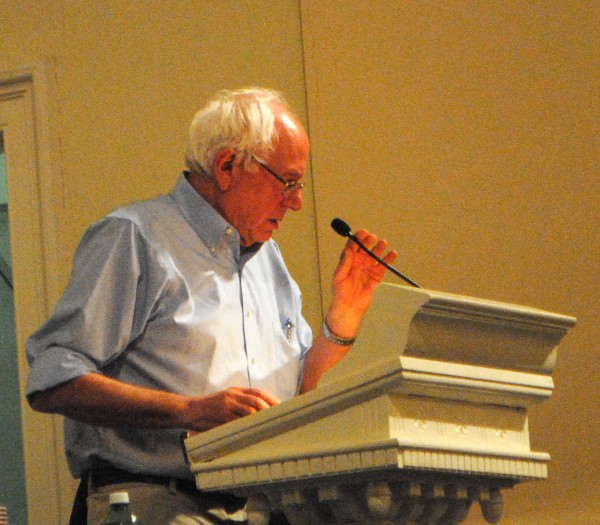
Bernie Sanders is the keynote speaker. He starts out strong, saying, “Climate change is real. The debate is over about about the cause and the impacts of global warming.” The crowd loves this. There are shouts of “Run, Bernie, run!”
But then there is a commotion. Some of the people sitting near me get up and unfurl a banner in front of Sanders that reads, “Bernie voted for the war on the indigenous people of Palestine.” Sanders is caught off guard by this, and his speech stumbles. Some in the crowd cheer for this reminder about the plight of Palestine, others are uncertain as to how to react. A woman comes forward and asks the protesters to “sit down, you’ve made your point.”
To my surprise, the protesters do sit down, their point well made.
Sanders rallies and gets back into his speech, but he’s off his game now, and he never quite resonates as strongly as when he started. Still, more than a third of the audience stands in applause as he wraps up. “Nothing passes the United States Congress without the approval of the Oil Companies, Corporate America and Wall St.,” says the Senator Sanders.
“Take to the streets,” he said. “We can hurt them.”
Bill McKibben, founder of 350.org, the man and the group most responsible for the People’s Climate March, begins by announcing that official estimates place the expected crowd at tomorrow’s rally at about 200,000 attendees. (In fact the number was twice that.) It will be by far the largest climate change rally in history.
McKibben talks about how opposition to the Keystone Pipeline led one oil executive to lament that, “We’ll never be allowed to build a pipeline in peace again.” There are laughs at this, but McKibben isn’t making jokes or declaring victories.
This march is bigger than one pipeline or tar sands oil or fracking, says Mckibben. This march is the “burglar alarm” on the people who are trying to steal our future.
“We need to take on the Koch Brothers directly,” says McKibben, adding that in the face of such a terrific threat to humanity and the planet, “It’s an obligation and a privilege to be around right now.”
Author Naomi Klein, whose new book, This Changes Everything: Capitalism vs. the Climate nails the climate change zeitgeist, made no apologies for framing the battle in stark economic and social justice terms. Klein maintains that the reason we can’t get off oil and adopt clean energy solutions is because of the neoliberal agenda advanced by free market extremists. Unrestricted free trade, the privatization of government services and the imposition of extreme austerity have crippled our ability to respond in any meaningful way to this imminent disaster.
We need to “break every rule in their idiotic playbook because [neoliberalism] is at war with life on Earth,” she said.
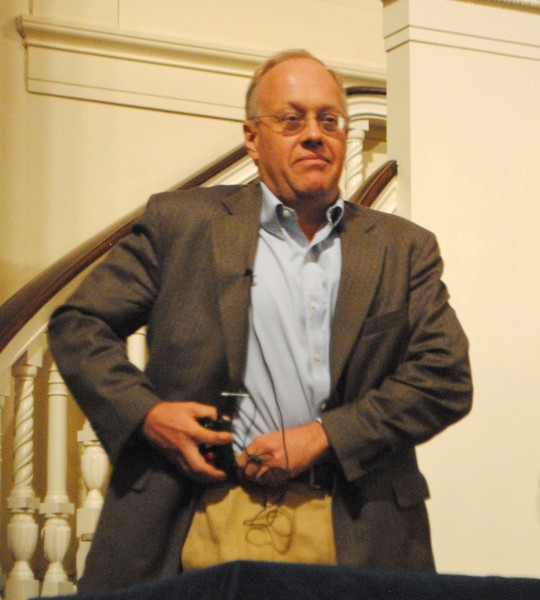
More dour and more radical was journalist Chris Hedges. The People’s Climate March, said Hedges, is but a “prelude to resistance.” Framing the issue as “the beginning of a titanic clash between our corporate masters and ourselves,” Hedges said that it is fast becoming time to “speak in the language of overthrow and revolution.”
Working with the Democratic Party, says Hedges, is pointless. “We’re pouring energy into a black hole.”
As the guests were introduced at the beginning of the program, the biggest cheers were for Kshama Sawant. No surprise; the line was packed with New York members of Socialist Alternative. In Seattle Sawant ran as an unrepentant and open socialist and won a seat on the Seattle City Council, pushing through a bill for a $15 an hour minimum wage, the highest minimum wage in the country. She donates most of her City Council pay to social change groups, keeping only “an average worker’s salary” for herself. She’s impressive, but when she speaks in her careful, accented way, she is electric.
Sawant stands and reads her simple declarative statements with both precision and compassion. “Tomorrow’s protests,” says Sawant, “must represent a turning point.” We must “bring the giant corporations into public ownership,” because, “you cannot control what you do not own.”
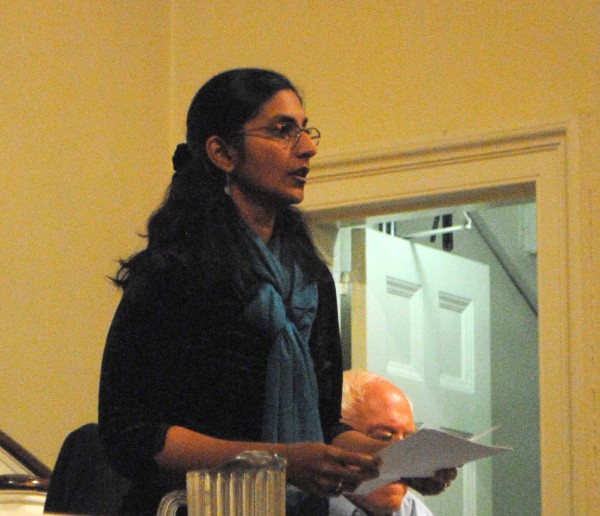
“We cannot be bound by what is acceptable to big corporations” who believe that, “the Market is God, and everything is sacrificed on the altar of profit.”
The crowd responds with enthusiasm or surprise. Klein, Hedges and Sawant, each more radical than the last, are literally calling for economic revolution as our only hope to avoid the burning of the planet.
When Sawant finishes, there are calls from the crowd. “You should run!” says one woman, echoing the calls of the Bernie Sanders supporters from the beginning of the forum. Sawant smiles. She surely recognizes that the call for her to run is an emotional, not logical reaction, but suddenly Sawant doesn’t seem to be channeling the past, as I mentioned when I saw her supporters selling newspaper outside. Instead, Sawant seems to be summoning the future.
As power and money continues to consolidate in the hands of fewer and ever more powerful corporate hands, and as the extinction clock for all life on Earth continues to count down, the revolutionary begins to seem less impossible and more imminent. As Naomi Klein says in the title of her book, climate change “changes everything.”

